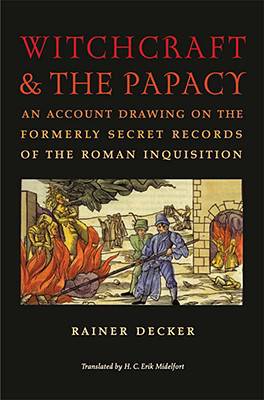
- Retrait gratuit dans votre magasin Club
- 7.000.000 titres dans notre catalogue
- Payer en toute sécurité
- Toujours un magasin près de chez vous
- Retrait gratuit dans votre magasin Club
- 7.000.000 titres dans notre catalogue
- Payer en toute sécurité
- Toujours un magasin près de chez vous
Witchcraft & the Papacy
An Account Drawing on the Formerly Secret Records of the Roman Inquisition
Rainer DeckerDescription
When Rainer Decker was researching a sensational seventeenth-century German witchcraft trial, he discovered, much to his surprise, that in this case the papacy functioned as a force of skepticism and restraint. His curiosity piqued, he tried unsuccessfully to gain access to a secret Vatican archive housing the records of the Roman Inquisition that had been sealed to outsiders from its sixteenth-century beginnings. In 1996 Decker was one of the first of a small group of scholars allowed access. Originally published as Die Päpste und die Hexen, Witchcraft and the Papacy is based on these newly available materials and traces the role of the papacy in witchcraft prosecutions from medieval times to the eighteenth century. Decker found that although the medieval church did lay the foundation for witch hunts of the sixteenth to eighteenth centuries, the postmedieval papacy, and the Roman and Spanish Inquisitions, played the same kind of skeptical, restraining role during the height of the witch-hunting frenzy in Germany and elsewhere in Europe as it had in the trial that was the initial focus of his research. Witchcraft and the Papacy overturns a large body of scholarship that confuses the medieval papacy with its markedly skeptical successors, and that mistakenly portrays the papacy as fanning rather than quelling the flames of the witchcraft mania sweeping northern Europe from the mid-sixteenth century onward.
Spécifications
Parties prenantes
- Auteur(s) :
- Editeur:
Contenu
- Nombre de pages :
- 280
- Langue:
- Anglais
- Collection :
Caractéristiques
- EAN:
- 9780813927473
- Date de parution :
- 29-11-08
- Format:
- Livre relié
- Format numérique:
- Genaaid
- Dimensions :
- 155 mm x 231 mm
- Poids :
- 521 g







